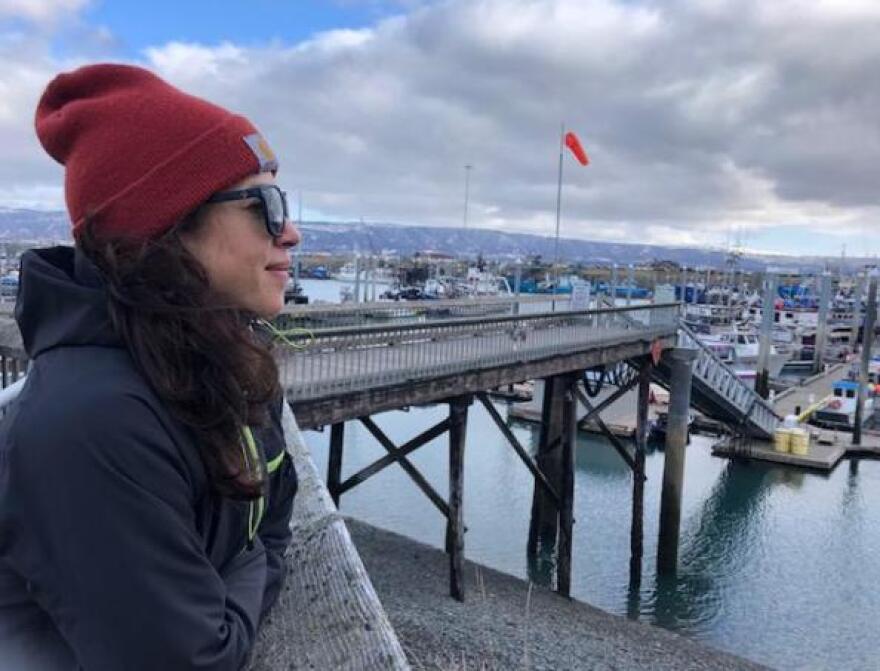In the commercial fishing industry, National Oceanic and Atmospheric Administration workers — known as “observers” — jump on board hundreds of vessels each year to make sure fishers are following federal regulations. But many of the women who perform these duties say they experience sexual harassment.
NOAA is trying to encourage more female observers to report those instances, even if they seem insignificant.
Alex Ravelo walked toward a sailboat she might buy in the Homer Port & Harbor. It’s a roughly 22-foot vessel with a red hull that she’d like to use to sail around Kachemak Bay.
“Oh, she’s the perfect adventure boat. Needs just a little bit of love,” Ravelo said.
Ravelo loves adventure. In fact, it’s what partly inspired her to become a NOAA Fisheries observer in 2006 soon after she graduated college. An observer collects data on board commercial fishing vessels to verify that fishers are following regulations surrounding harvest practices and limits.
Ravelo said some boats created a more welcoming atmosphere for women than others. Sometimes she would see pornographic magazines lying around, and other times she was subjected to sexually inappropriate teasing and jokes.
But for the most part, she would just brush it off.
“I did want to show that I was capable, and that I could joke around,” Ravelo said. “And I wouldn’t get upset by little things.”
However, she said in one instance a male crew member tried to prevent her from leaving a room after they were joking around.
“Then he just kind of, like, grabbed me, and he was a very large man,” Ravelo said. “I felt very trapped, and I just pushed him away. But I had to use all my strength to get his arms from around me and stormed out of there.”
Ravelo never filed a report, saying it was an isolated event. Eventually, Ravelo moved on to pursue her graduate degree in marine biology.
Even if Ravelo’s experience is few and far between, others like former observer Bobbie Buzzell say it’s hard to know when less extreme interactions should be considered harassment and be reported.
“How am I supposed to distinguish whether or not it’s just in good fun? Or is it starting to cross a line with me?” Buzzell said. “There’s just a huge gray area, I think.”
Jaclyn Smith works for NOAA’s law enforcement division and said she hears those types of comments all the time.
“I’ve heard a lot of observers say things like, ‘Well, it’s Alaska, it’s the fishing industry. I should expect this type of behavior,’” Smith said.
She said there are roughly 350 observers in Alaska, and about half are women. Smith sent an anonymous survey to observers deployed in Alaska in 2016 and 2017. About a quarter of female observers responded, and roughly half said they had experienced sexual harassment aboard vessels. They say they declined to report for several reasons, including fear of backlash and that nothing would be done about it.
“So that’s why I kind of started to adjust the training that I was doing, trying to encourage observers to come forward to report things that were happening to them, even things that they thought wasn’t a big deal,” Smith said.
Smith is incorporating role-playing scenarios into her training program and encouraging NOAA officers to be more personable with observers, hoping that it will make it easier for them to file reports of sexual harassment.
It’s hard to say if these efforts will create change. Fewer than 20 reports have been filed annually over the past few years, and numbers can vary widely.
Ravelo thinks more training for observers could make a difference, but she said it’s only half of the problem — meaning that fishing crews need to address harassment from within.
“I’ve been on so many boats where the attitude and the relationships that were built on those boats were so healthy and so friendly and professional,” Ravelo said. “If it’s possible on some boats, why wouldn’t it be able to happen everywhere?”
While Ravelo left her observer position to pursue her graduate degree, she said a change in the commercial fishing culture could help reduce turnover of women in the observer program.

